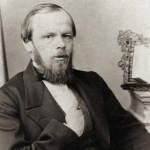
11.01.2023
The court recognized him as “one of the most important criminals” for reading and “for not reporting on the dissemination of a criminal letter about religion and government by the writer Belinsky.”
Sentence

Until November 13, 1849, the Military Court Commission sentenced F. M. Dostoevsky to deprivation of all rights of the state and “death penalty by firing squad”. On November 19, Dostoevsky’s death sentence was overturned by the conclusion of the General Audience “due to the discrepancy between his guilt of the convicted person” and the conviction to an eight-year term of hard labor. At the end of November, Emperor Nicholas I, when approving the verdict prepared by the general audience, replaced the eight-year term of hard labor for Dostoevsky with a four-year one, followed by military service as a private.
Hard labor
During a short stay in Tobolsk from January 9 to January 20, 1850, on the way to the place of penal servitude, the wives of exiled Decembrists J. A. Muravyev, P. E. Annenkova and N. D. Fonvizin arranged a meeting of the writer with other staged Petrashevites and through Captain Smolkov gave each the Gospel with money discreetly pasted into the binding (10 rubles). Dostoevsky kept his copy of the Gospel all his life as a relic. Dostoevsky spent the next four years in hard labor in Omsk. Besides Dostoevsky, only one more Russian writer of the XIX century, N. G. Chernyshevsky, passed through the harsh school of penal servitude. The prisoners were deprived of the right to correspond, but while in the infirmary, the writer was able to secretly keep records in the so-called “Siberian notebook” (“my convict notebook”).

Impressions from the stay in the prison were later reflected in the story “Notes from the Dead House”. It took Dostoevsky years to break the hostile alienation towards himself as a nobleman, after which the prisoners began to take him for their own. The first biographer of the writer O. F. Miller believed that penal servitude became “a lesson of folk truth for Dostoevsky.” In 1850, excerpts from the novel “Poor People” and a positive review of it were published in the Polish magazine “Warsaw Library”. By the time of the writer’s stay in penal servitude, the first medical statement of his illness as Epilepsy refers, which is evident from the attached certificate of doctor Ermakov to Dostoevsky’s 1858 resignation addressed to Alexander II.
After his release from prison, Dostoevsky spent about a month in Omsk, where he met and became friends with Chokan Valikhanov, the future famous Kazakh traveler and ethnographer.At the end of February 1854, Dostoevsky was sent as a private to the 7th Siberian Linear Battalion in Semipalatinsk[93]. There, in the spring of the same year, he began an affair with Maria Dmitrievna Isaeva, who was married to a local official Alexander Ivanovich Isaev, a bitter drunkard. After some time, Isaev was transferred to the place of the caretaker of taverns in Kuznetsk. On August 14, 1855, Fyodor Mikhailovich received a letter from Kuznetsk: M. D. Isaeva’s husband died after a long illness.




